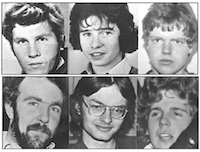
Eight families of collusion victims have met with the Policing Board to express concern at a decision to transfer investigation of the north Belfast murders away from the Historic Enquiries Team (HET) to the PSNI’s Serious Crime Branch.
To date more than 20 members of the unionist paramilitary UVF have appeared in court charged with offences carried out by the UVF’s Mount Vernon gang. It has emerged in recent years that the gang worked closely with the PSNI/RUC Special Branch.
PSNI chief Matt Baggott claimed in December that he was transferring control of the investigation from the HET as part of cost-cutting. However, the victims’ families have reacted angrily to the move, expressing fears that it would prevent a proper investigation into their loved ones’ deaths.
The HET’s investigations were credited with bringing a number of those involved to court.
Paul McKenna, whose sister Sharon was s hot dead by the UVF in 1993, said they believed the decision could stop PSNI/RUC Special Branch officers from being arrested.
“We met with the Policing Board to tell them that we will not accept any more cover-ups,” Mr McKenna said.
“We have been messed around for for too long and have told them that enough is enough.”
It is understood that a three-person commission to oversee the police investigation will now be established to try to regain the trust of families.
However, they warned the Policing Board this week that they would not accept anyone other than former police ombudsman Baroness O’Loan to head the commission.
Leading English barrister Michael Mansfield QC is understood to be another of those who has been asked to join the commission.
“There were names suggested by others but we let the Policing Board know in no uncertain terms that we will only accept [her] as the chair,” he said.
“We want to be kept directly informed about the state of the investigation by this commission at all times.
“The meeting with the Policing Board was very emotional but we were satisfied with the level of support for our plight.
“But we left them in no doubt that we will not accept being messed around any further and unless we have full confidence in this commission then we will withdraw our support and walk away.”
Meanwhile, relatives of shoot-to-kill victims are having their human rights violated by the delay in holding inquests, the High Court in Belfast heard this week.
Lawyers for some of the families involved in a legal battle over the disclosure of secret reports urged a judge to dismiss a new challenge brought by the PSNI chief.
The PSNI are seeking to judicially review an order from senior coroner John Leckey to hand over copies of probes, even in a censored form, into a series of suspected RUC shoot-to-kill operations 28 years ago.
The PSNI’s legal team is contesting the direction to supply the “redacted” versions, which would then be forwarded to next of kin, without further court action.
They are seeking to quash the coroner’s decision, claiming it is unlawful and impedes their attempts to secure further ‘gag’ orders (Public Interest Immunity certificates) on the files.
The case involves six people, including IRA and INLA Volunteers and a Catholic teenager, shot dead around Lurgan and Armagh in 1982.
An investigation into whether the PSNI (then RUC) planned to kill them was carried out by British policemen John Stalker and Colin Sampson. The Stalker/Sampson reports have never been made public.
The deaths at the centre of the legal fight include IRA men Eugene Toman, Seen Burns and Gervaise McKerr near Lurgan.
Mr Leckey also plans to hold inquests into the deaths of Catholic teenager Michael Tighe, shot dead by the RUC at a hay shed near Craigavon in November 1982, and IRSM members Roddy Carroll and Seamus Grew who were killed near Armagh a month later.
The British government has always denied that any policy existed of ‘shoot-to-kill’ -- the deliberate targeting by ambush of selected republicans.
![[Irish Republican News]](https://republican-news.org/graphics/title_gifs/rn.gif)
![[Irish Republican News]](https://republican-news.org/graphics/title_gifs/harp.gif)

